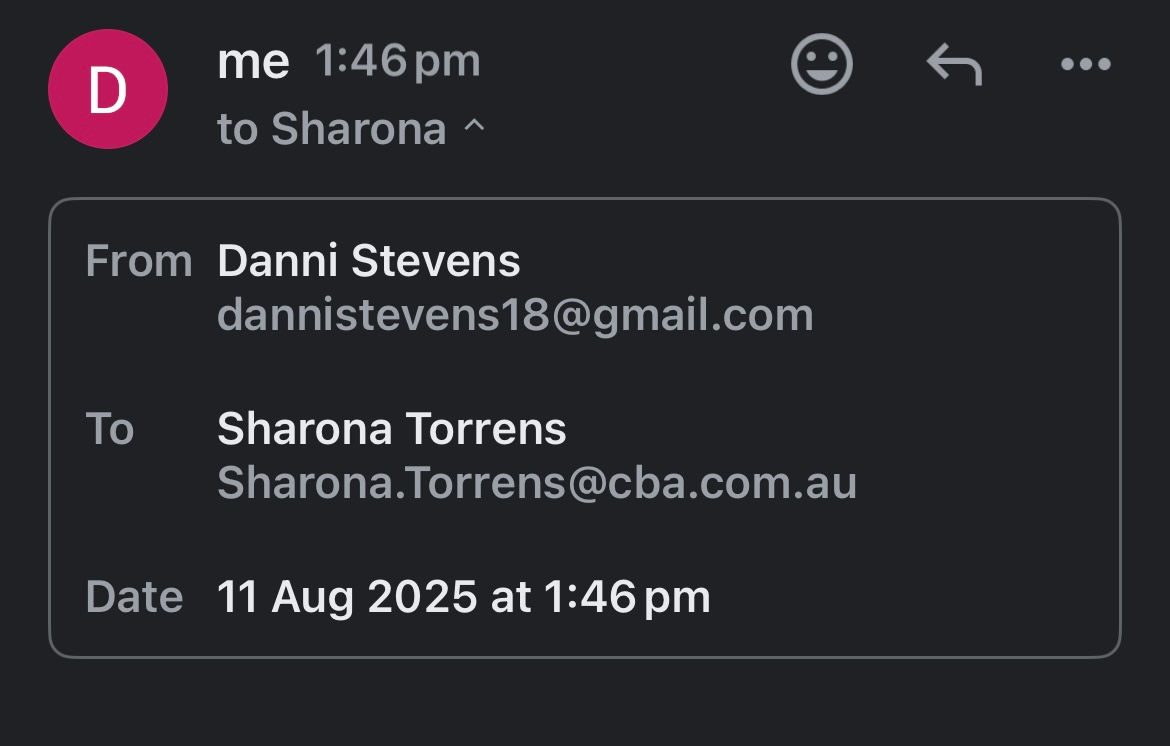
Comm Bank
- agentorangechild
- Aug 11, 2025
- 6 min read
Updated: Aug 16, 2025
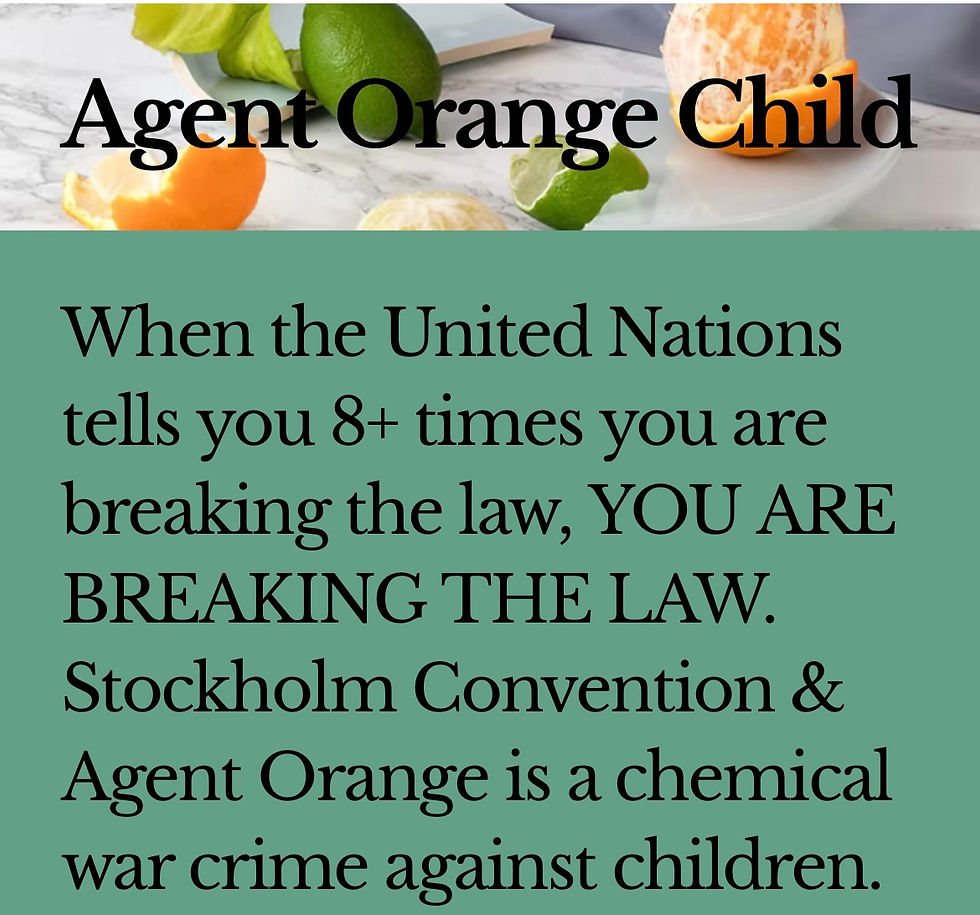
Dear Danielle
Thank you for your email dated 26 July. I acknowledge your email and the concerns you have raised in it. At Commonwealth Bank, our overall approach to human rights is guided by the United Nations Guiding Principles on Business and Human Rights, which states governments have a duty to protect human rights and businesses have a responsibility to respect human rights. We seek to do this by meeting the human rights-related requirements set out in our Group’s Environmental and Social Framework.
Confidentiality obligations prevent me from disclosing whether the entities you have named in your email are customers. However, our relationship with our customers and suppliers is subject to our Environmental and Social Framework, Group policies, and applicable laws.
Regards
Sharona
Subject: Re: Human Rights & TCDD Exposure – Urgent Compliance Clarification
Dear Sharona,
Thank you for your acknowledgement dated Monday 11th August 2025.
You have confirmed that Commonwealth Bank’s approach to human rights is guided by the UN Guiding Principles on Business and Human Rights (UNGPs), which establish that:
Businesses have a responsibility to respect human rights; and
Where businesses are directly linked to human rights abuses through their operations, products, or services, they have a duty to take appropriate action to prevent or mitigate harm and to provide or cooperate in remediation.
I now require clear, written confirmation of the following:
Whether Commonwealth Bank has undertaken enhanced due diligence on any entity, client, or supplier linked to the production, distribution, financing, or governmental administration of TCDD (Agent Orange), given its status as a Persistent Organic Pollutant banned under the Stockholm Convention and the well-documented human rights violations associated with its use and concealment.
Whether your Environmental and Social Framework contains explicit prohibitions or risk controls for financial relationships with entities implicated in:
Crimes against humanity under Article 7 of the Rome Statute;
Breaches of the Stockholm Convention and other binding environmental/human rights treaties;
State-facilitated obstruction of redress for civilian victims.
If such prohibitions exist, whether Commonwealth Bank has terminated, restricted, or reported any relevant relationships since the UNGPs were adopted, and whether these actions are publicly documented.
If such prohibitions do not exist, please confirm whether this omission has been formally risk-assessed, and explain how the Bank can reconcile that position with its stated adherence to the UNGPs, OECD Guidelines for Multinational Enterprises, and applicable anti–money laundering and counter–terrorism financing obligations.
This request is not seeking confidential customer information. It seeks confirmation of governance processes and compliance actions—which the UNGPs require businesses to disclose in the interests of transparency and accountability.
Please treat this as a formal human rights due diligence request under the UNGPs, OECD Guidelines, and applicable Australian corporate governance standards. Your response will be placed on record in my submission to the International Criminal Court and relevant OECD National Contact Points.
I expect your reply within 14 days of this email. Silence will be treated as an admission of failure to meet the UNGPs’ transparency and remediation standards.
Warm Agent Orange Burns regards,
Danielle Stevens
We will always be a child of a Vietnam Veteran
A formal complaint has been lodged with the International Criminal Court for Crimes against Humanity. The final submission was the 1st of July 2025.
Australia ratified International treaties but failed to implement them into domestic laws.
Commonwealth Bank reply – 11 August 2025
(Line-by-line with legal commentary)
“Thank you for your email dated 26 July. I acknowledge your email and the concerns you have raised in it.”
Commentary: This is an acknowledgement without engagement. Under the UN Guiding Principles on Business and Human Rights (UNGPs) Principle 17, CBA must identify and assess adverse human rights impacts raised to them. Here, they have acknowledged but failed to indicate any investigative or remedial action. This breaches UNGP Principle 19 and OECD Guidelines Chapter II, paragraph 10 (due diligence).
“At Commonwealth Bank, our overall approach to human rights is guided by the United Nations Guiding Principles on Business and Human Rights, which states governments have a duty to protect human rights and businesses have a responsibility to respect human rights.”
Commentary: This is a misrepresentation by omission. The UNGPs require businesses to have a policy commitment, conduct human rights due diligence, and enable remediation. By quoting the “duty to protect” clause for governments, CBA is shifting primary responsibility away from themselves, contradicting UNGP Principle 11 and OECD Guidelines Chapter IV, paragraphs 1–2, which make corporate responsibility independent of government action or inaction.
“We seek to do this by meeting the human rights-related requirements set out in our Group’s Environmental and Social Framework.”
Commentary: Referencing an internal framework without explaining how it addresses the specific TCDD/Agent Orange crimes against humanity risks raised is non-disclosure in breach of UNGP Principle 21 (communicate how impacts are addressed) and OECD Guidelines Chapter III (disclosure). Without confirming whether the framework prohibits high-risk relationships or mandates enhanced due diligence, this is a smokescreen.
“Confidentiality obligations prevent me from disclosing whether the entities you have named in your email are customers.”
Commentary: This is false framing. You did not request client identities — you requested confirmation of governance processes and due diligence measures for entities linked to TCDD production/distribution. Under UNGP Principle 21 and OECD Guidelines Chapter III, paragraph 1, process-level disclosures are required and can be given without breaching client confidentiality. Using confidentiality here is an avoidance tactic that hides potential non-compliance.
“However, our relationship with our customers and suppliers is subject to our Environmental and Social Framework, Group policies, and applicable laws.”
Commentary: This is circular referencing — citing policies without demonstrating their application. Under OECD Guidelines Chapter IV, paragraph 5, businesses must carry out risk-based due diligence and cease, prevent, or mitigate impacts. Under Stockholm Convention Article 5, state parties (and by extension state-regulated businesses) must eliminate production and use of listed POPs like TCDD and prevent harm from stockpiles or wastes. This shows no evidence those obligations are being met.
Summary: This letter is a textbook example of bad faith engagement under the OECD Guidelines and UNGPs. It acknowledges without investigating, claims adherence without evidence, and hides behind irrelevant confidentiality excuses. In the context of crimes against humanity under the Rome Statute and Stockholm Convention breaches, this is not a neutral corporate response — it is part of the obstruction itself.
This is not a local dispute. The conduct of banks linked to TCDD (Agent Orange) financing, insurance, or facilitation is now under review in the United Kingdom, the Netherlands, and Switzerland through OECD National Contact Point proceedings, with all findings to be cross-referenced to an active International Criminal Court complaint for crimes against humanity and breaches of the Stockholm Convention. This is a coordinated, multi-jurisdictional compliance action that extends beyond any single country’s borders and into some of the strictest human rights and financial oversight regimes in the world. Continued denial, deflection, or non-engagement will be treated as evidence of willful obstruction across all jurisdictions — and will follow every implicated bank into every international forum where this case is heard.
This entry will appear in Annex B of my ICC submission. It documents the Commonwealth Bank of Australia’s missed deadline and their late, evasive response to a formal human rights due diligence request regarding TCDD (Agent Orange) crimes against humanity.
Entity: Commonwealth Bank of Australia (CBA)
Date of Original Deadline: 7 August 2025 – 10:00am (AEST)
Date of CBA Acknowledgement: 11 August 2025
Summary: Acknowledgement without engagement – non-compliance with UNGPs/OECD due diligence obligations.
Details:
CBA failed to respond by the stated 7 August 2025 deadline to a formal human rights due diligence request issued under the UN Guiding Principles on Business and Human Rights (UNGPs), OECD Guidelines for Multinational Enterprises, and applicable international treaties including the Stockholm Convention.
A late response was received from “Sharona” on 11 August 2025. The email acknowledged receipt of the 26 July 2025 notice but:
• Avoided answering the core due diligence and governance questions relating to TCDD (Agent Orange) financing, insurance, and facilitation.
• Quoted the UNGPs selectively, shifting primary responsibility to governments rather than fulfilling CBA’s independent corporate duty to respect human rights (UNGP Principle 11).
• Referenced internal frameworks without disclosing how they address the specific, severe risks raised, in breach of UNGP Principle 21 (communication) and OECD Guidelines Chapter III (disclosure).
• Invoked “confidentiality obligations” to avoid process-level disclosure, despite no request for customer identities, representing a false framing and evasion tactic.
In addition, Commonwealth Bank (or individuals acting on its behalf) has accessed my public website repeatedly in recent days, viewing multiple pages related to the Bank and its obligations under the UNGPs and OECD Guidelines. Despite this repeated access, there has been no direct engagement or substantive response to the due diligence questions posed prior to the 7 August 2025 deadline. This behaviour will also be recorded as evidence of ongoing monitoring without remediation in Annex B of my ICC submission.
Conclusion:
This response constitutes bad-faith engagement under the OECD Guidelines and a failure to meet UNGPs’ transparency and remediation requirements. The missed deadline, coupled with selective quotation and evasion, will be treated as evidence of wilful obstruction. This entry is cross-referenced to ongoing OECD National Contact Point proceedings in multiple jurisdictions and the ICC complaint (filed 1 July 2025) alleging crimes against humanity and breaches of the Stockholm Convention.
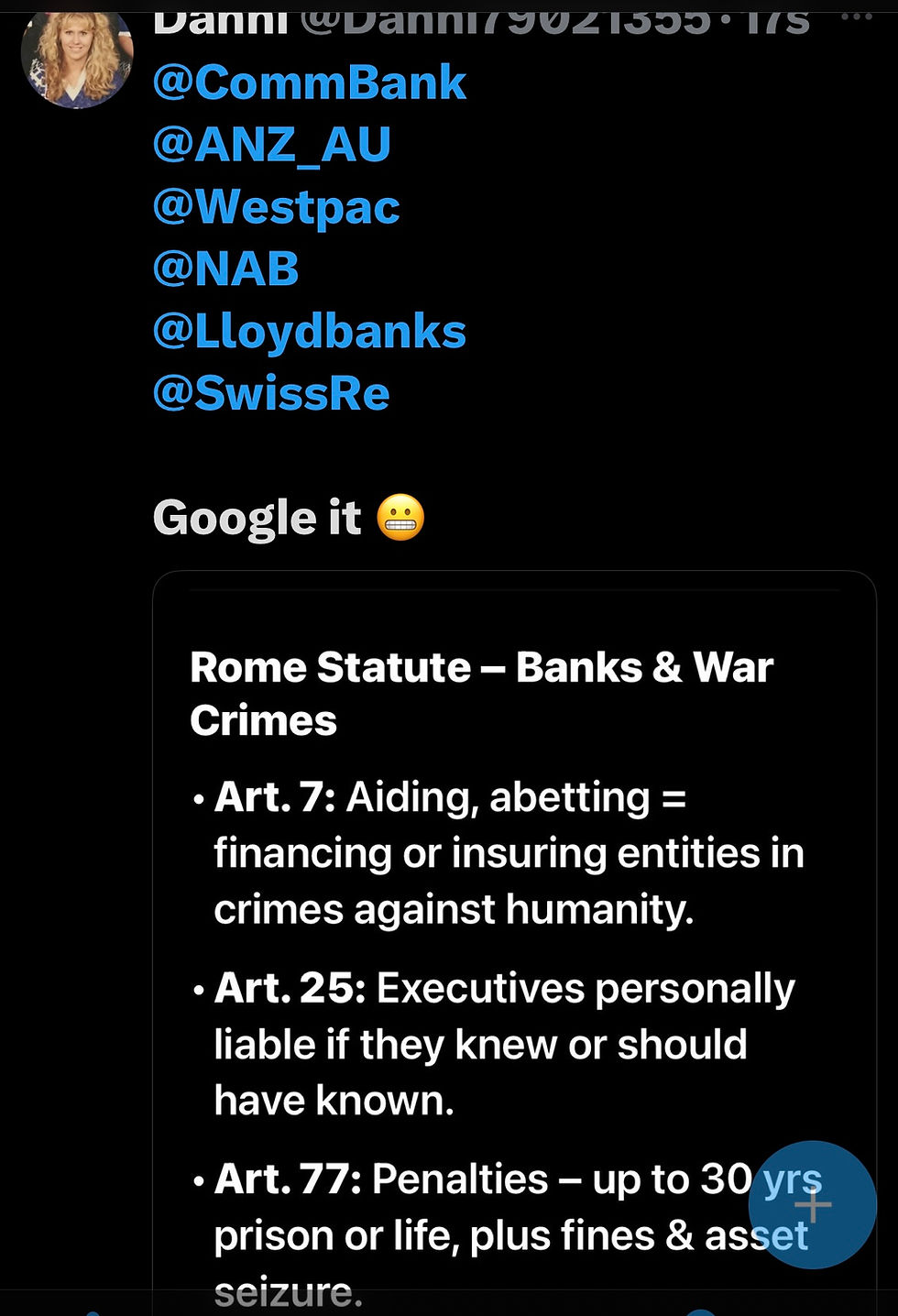
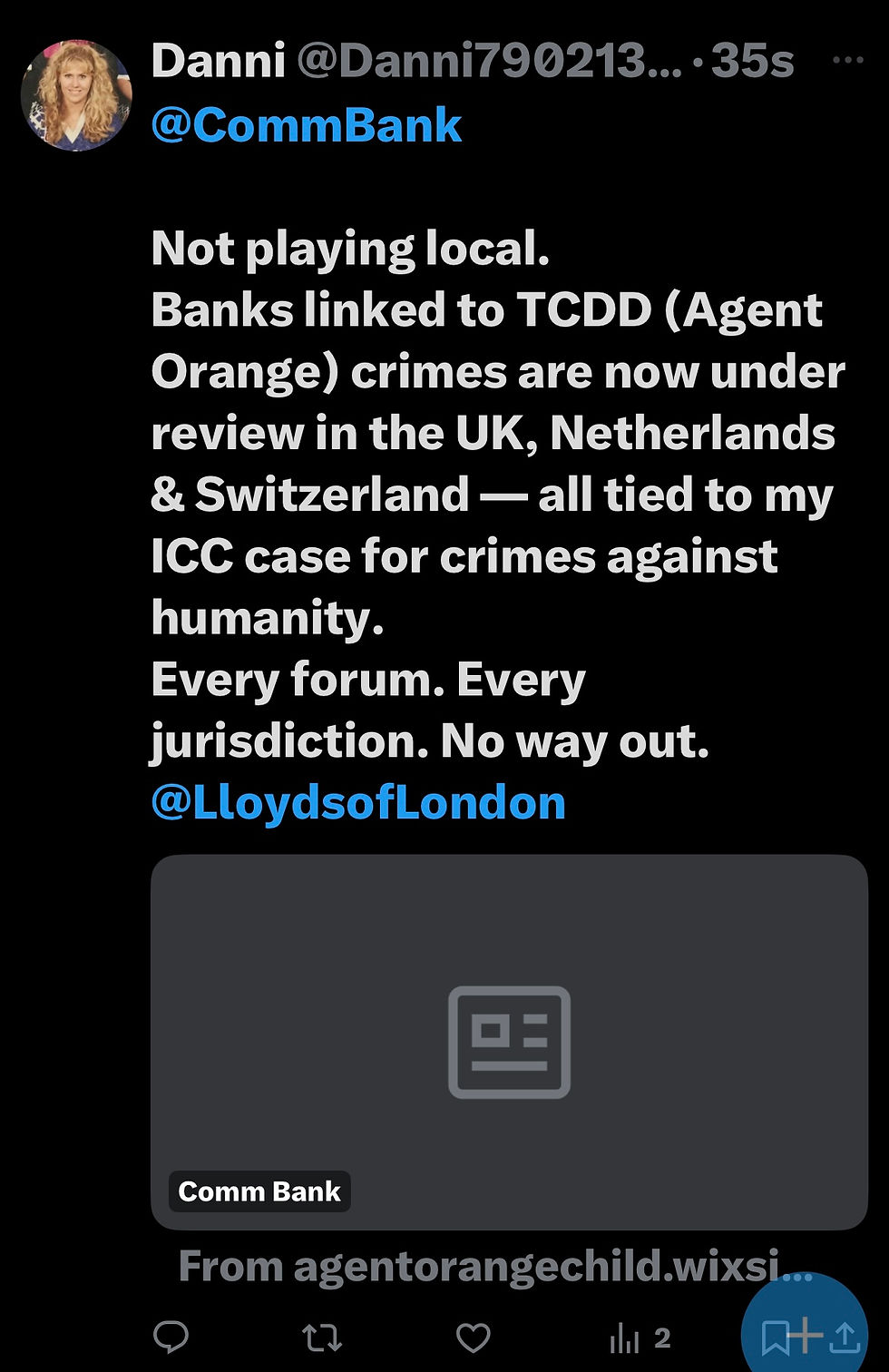
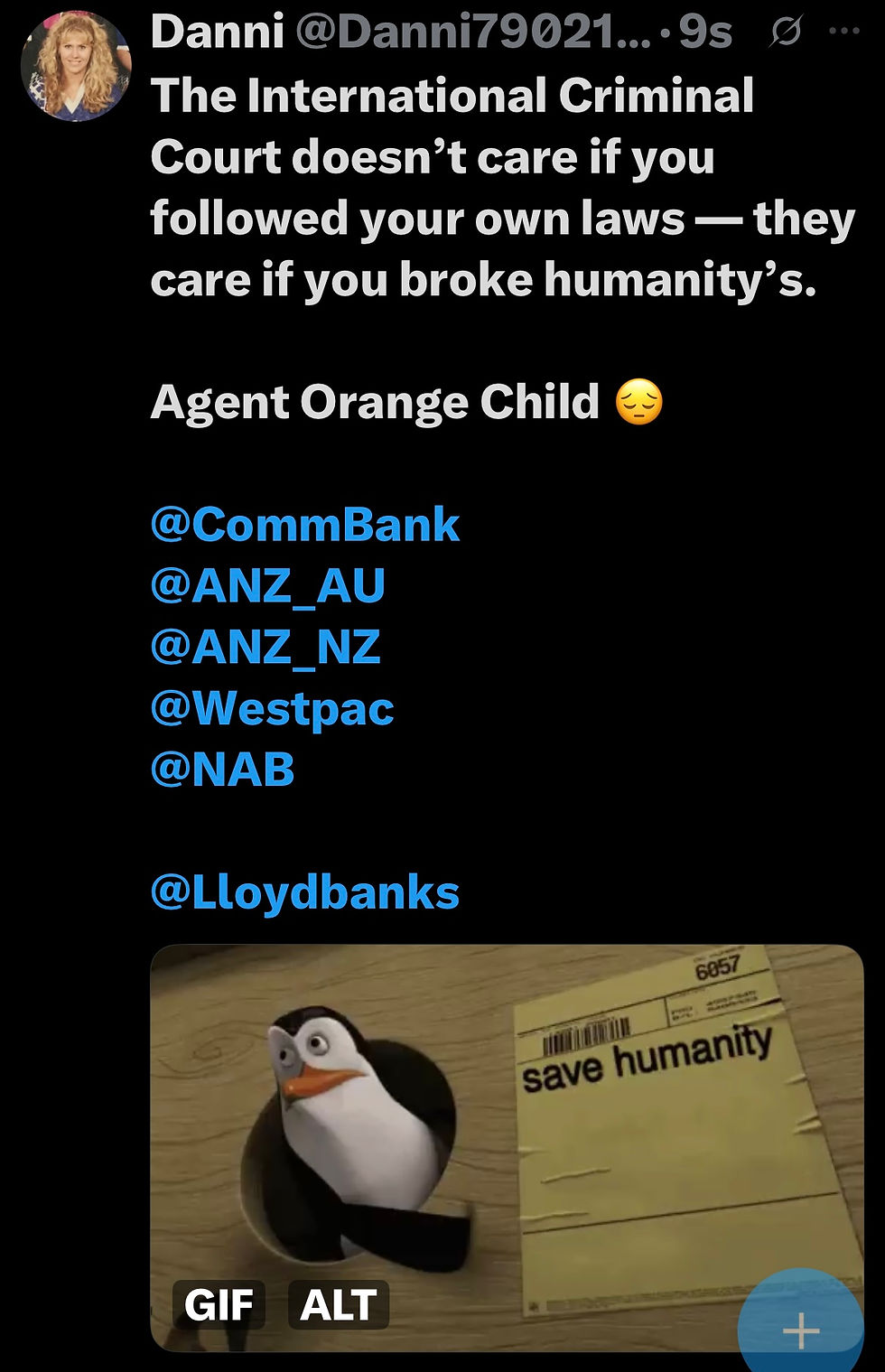


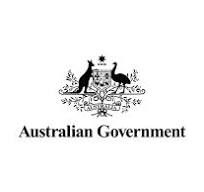
Comments